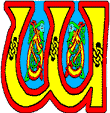 elcome! elcome! |
Please Note! As of February 15, 2004 these pages are still under development and there are gaps in content and design. I now expect it will be a continuing process. Right now the texts and translations should be reliable. And the bibliograpical department is more complete than any other I know. I had hoped to complete making the notes in Williamson's edition available, but handling them as graphics has serious problems and scanning them as text does too . There will be more papers and essays available by September. |
T his
is the home page of the Kalamazoo Riddle Group. We plan to make it a comprehensive
web site for those interested in the Riddles of the Exeter Book with supplementary
features relating to the "riddling" aspects of lyrics of any
time or place. Our conviction is that the Riddles of the Exeter Book are
worthy of the interest and respect due all the wonderful creations of
the human spirit.
Listed
below are the departments ready to receive visitors. These will be enhanced
and others added as time and resources make possible. Currently, it is
being developed by William F. Klein, a member of the English department
at Kenyon College, email: klein@kenyon.edu.
T
his site will be growing every week this semester, so please check back.
I would particularly appreciate corrections, suggestions and addresses
of other relevant sites.
I. For the
history and activites of the Riddle Group at the recent International
Congresses on Medieval Studies please click on Kalamazoo. We are in the process
of providing access to the papers read at the meetings. The links will
be the authors last name, highlighted.
II. For access
to the texts of the Riddles accompanied by translations, please click
on Texts.
The file for each Riddle now includes Williamson's text and his translations
in A Feast of Creatures.
Three different kinds of "introductions" to the Riddles are
now availble on this site. I believe that Craig Williamson's critical
discussion of the "poetic" of the Riddles represents the high
water mark of a synthesizing study of the Riddles by a single person since
Frederick Tupper. It also raises the matter of the "poetic"
of the Riddles that has fascinated readers since Tupper and most recently
Daniel Tiffany in Critical Inquiry (see "Lyric Substance:
On Riddles, Materialism, and Poetic Obscurity," QI 28: Autumn
2001). I have been experimenting with formatting this work to see if pure
text on that scale can be made "Web" readable. I call the result
"analytical formatting" in which the structure of the exposition
is reflected in the layout and coloring of the text. I would appreciate
reactions to the experiment. Click on the link provided here: A
Feast
of Creatures: Anglo-Saxon Riddle Songs.
Besides the texts and some notes from Williamson's edition
of the Riddles (The Old English Riddles of the Exeter Book, Chapel
Hill, 1977) his "Introduction" is also now available; click
on Introduction. The laborious process of making the "Glossary"
to this edition is coming along. You can access what is currently available
by clicking on Glossary.
This year I hope to have available here a collection of "Basic Readings"
in the scholarship on the Riddles. A more distanct hope is the idea of
making avaible important essays and the collective work of important scholars.
I am thinking, for example, of Marie Nelson, who has a impressive collection
of essays scattered in various locations which she is unlikely to be able
to publish. More could be done than we have found time to do it. Still
. . .
III. For a
bibliography supplementary to that provided in Craig Williamson edition
The Old English Riddles of the Exeter Book, please click on Listing. The chronological listing
is supplemented by an alphabetical list of Authors
and a list of Journals
in which more than two articles on the Riddles have appeared since 1975.
IV. At
the Riddle Session in Kalamazoo, May 2001, one topic of discussion was
the need to provide teachers working at all levels of education ready
access to the Riddles. The very first and very preliminary steps are now
being made. We hope these beginnings will lead to a rich array of suggestions
for use of the Riddles in the College Classroom and will also provide
texts, translations and commentary in forms and packages readily printed
and available for unrestricted copying. To look at the first step in that
direction click on Teaching.
V. A list
of important and useful web sites could become substantial, I presume.
But let us begin with the most obvious one:
| 1.) The Labyrinth: Resources For Medieval Studies |